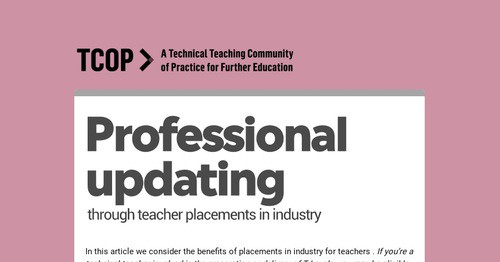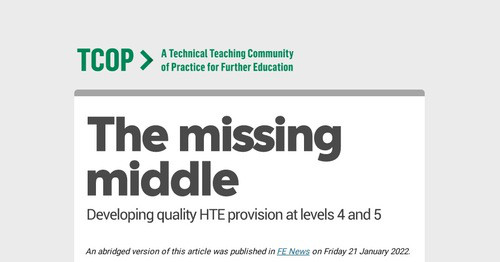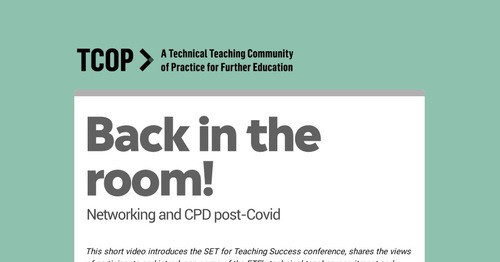
Share your skills
Exploring the DfE's FE sector teacher recruitment drive
Further Education is currently in the spotlight and receiving long-deserved recognition for the part that it is and can play in the UK’s economic recovery – post-Brexit and post-Covid – and towards a greener, brighter future, prioritising social mobility through the levelling-up agenda and working to address longstanding inequalities.
However, Further Education can only fulfil that role if it has technically expert and experienced teachers, trainers and support staff capable of delivering high-quality technical education at all levels for all learners. Providers need to recruit teachers and trainers who are able to:
- develop learners’ occupational knowledge, skills and behaviours that are aligned with those required in industry
- recontextualise that knowledge for the classroom, workshop and laboratory to bring learning to life, providing real world contexts
- maintain and develop employer/provider partnerships that will enable a clear line of sight to work through co-curriculum design, planning and delivery which also includes opportunities for enrichment activities.
Open access online course from the ETF
In 2021 the ETF launched ‘Preparing for a career in FE teaching and training’, an online course that provides an broad and stimulating introduction to teaching and training in the sector. It is free to access; consider sharing it with new and prospective staff.
Of course, outside of technical teaching the sector needs a pipeline of excellent teachers in academic subject areas, specialist teachers in English, maths, digital and SEND, excellent leaders and the legions of administrative, support and engagement staff that make great institutions run effectively. (Of course, we also need a pipeline of technical and STEM learners – we will explore this more in a future TCOP article.)
FE needs to work to overcome its long-standing recruitment (and retention) challenges and – in January 2022 – the Department for Education launched a “Teach in Further Education” campaign to help it do just that.
The DfE campaign builds on some of benefits that FE teaching and training provides in contrast with other parts of the UK education sector with the following key messages:
“Change lives not your career”
The campaign aims to appeal to one of FE’s big advantages: part time roles are plentiful and – in technical teaching – potentially advantageous in terms of imparting current knowledge, skills and behaviours in the classroom. Employer partnerships could be effective not only in designing curricula, building apprenticeship programmes and providing T Level industry placements – they could be a source of part-time teaching staff, and really embed mutual benefit for partners and providers.
‘Dual professionals’ working in both industry and education can help provide learners with a ‘line of sight to work’ and ensure that current industry practices are at the heart of teaching and learning in the classroom, workshop and laboratory.
In a volatile and challenging employment market – currently it is very much an ‘employee’s market’ – this kind of synergy could support business too, providing development opportunities for their staff, upskilling and reskilling to retain talented and experienced individuals who might, otherwise, look elsewhere.
People want to take their skills elsewhere too: a lifetime of trade or technical experience can feel ‘lost’ otherwise – FE teaching and training allows individuals to carry their knowledge, skills and experience into a new occupation.
Consider: does your organisation use its network of employer partners to support recruitment? Is your organisation targeting career-changers in its recruitment campaigns? Could the new marketing collateral from ‘Teach in Further Education’ help?
The DfE’s Stakeholder Toolkit is available here.
“You do not need a degree to start teaching in further education”
It’s generally true, unfortunately, that people associate teaching with the schools sector, which has benefitted from some very high-profile and long-running recruitment campaigns, and many potential teachers ‘rule themselves out’ on the basis that finding time, or funds, for a PGCE isn’t realistic in the context of their commitments and career.
Of course, teaching in FE doesn’t have the same pre-requisites as school teaching, and the DfE’s campaign makes this clear. Concurrent with the recruitment campaign, the DfE will fund Round 4 of ‘Taking Teaching Further’ (delivered by the Education & Training Foundation) to support providers in offering new recruits an employment-based pathway to a Level 5 teaching qualification supported by paired-teaching, mentoring, work-shadowing and remission to reduce first year teachers’ workload.
‘I feel lucky to have such a rewarding career’
Read this Guardian article, from 24 February 2022, profiling Rosa Wells, ETF and Royal Commission Technical Teaching Fellow, oart of the DfE campaign.
For potential career-changers, minimising any gaps in income and having strong support through that challenging first year is essential to make a career in FE teaching achievable and rewarding.
Consider: has your organisation signed up to Taking Teaching Further? Are your processes for recruiting, onboarding, training and supporting new teaching and training staff as good as they can be? If not, what needs to change?
In this video, from the ETF’s ‘Preparing for a career in FE teaching and training’ course, FE teachers answer the question: Why did you choose to work in FE?
“FE teaching is rewarding”
The campaign also emphasises the rewards that all of us know we can obtain from FE teaching and training roles:
- the joy of sparking a ‘lightbulb’ moment in a learner
- the satisfaction of seeing apprentices working through qualification levels
- the pleasure of being part of a campus and community and being at the heart of local and regional regeneration.
FE teachers and trainers really do change lives. However, the rewards of teaching can, sometimes, be lost in the workload and demands of the job and – hand-in-hand with recruitment – the sector needs to address teacher retention, including through CPD:
“…teachers and lecturers are not always able to access the high-quality professional development opportunities they need to improve their practice and support progression in their careers. This has significant implications for the quality and retention of teaching staff in further education: 52% of those who left the sector said that more training and opportunities would have made them less likely to leave.” [Ref 1]
Of course, CPD post-Covid will take some time to settle into new delivery patterns (considered in our TCOP article here) but – if you’re not already – take some time to explore the huge range of workforce development support provided by the ETF to support #FErecovery: https://www.et-foundation.co.uk/
Consider: when was the last time you accessed CPD? If you’re a leader in FE, is there room for improvement in your CPD provision across your organisation?
In this view, from the ETF’s ‘Preparing for a career in FE teaching and training’ course, FE teachers consider the rewards of teaching and training in the sector.
Volatility in ITT take-up
The take-up of initial teacher training also seems to be volatile. It saw a rise in 2021, in the midst of Covid insecurity and national lockdowns, but recent figures from the school sector suggest a 23% drop [Ref 2] which is likely to be replicated in uptake in the FE sector.
Reason to be optimistic
It’s going to be challenging, but FE has some very welcome investment, support and attention to help it realise its potential right now. Now would be a good time for FE providers to assess their recruitment needs, review their retention and work out what needs to change to drive improvement, making the most of the recruitment campaign resources and ETF support offers:
Teach in further education | campaign website
Stakeholder toolkit (plus branding guidelines, logos and marketing assets)
Take some time to read the DfE’s “Education Hub blog” from 24 January 2022: “Everything you need to know about how we're helping young people and adults get the skills they need to succeed” which signposts to the range of support and skills courses available to both adult and younger learners.
It’s an exciting time to work in Further Education – but if the sector can rise to the challenges currently asked of it, that excitement will only increase.
Take some time to consider the part that you can play.
References
1. DfE, 2021. Skills for Jobs: Lifelong Learning for Opportunity and Growth [online]. Department for Education. [Accessed 01 February 2022]
2. TES, 2022. ITT applications down by 23 per cent [online]. TES Magazine. [Accessed 01 February 2022]






